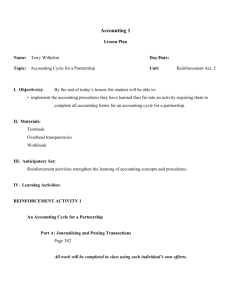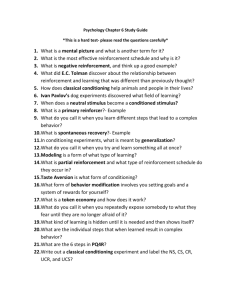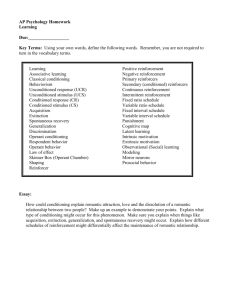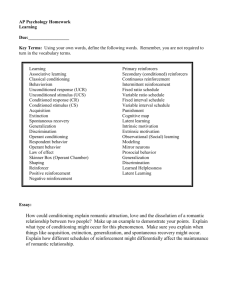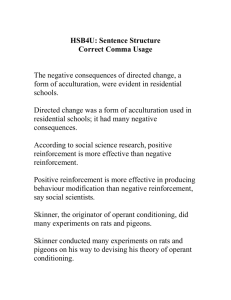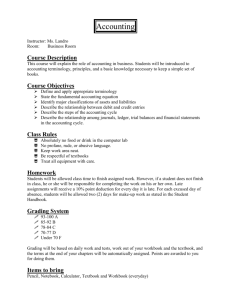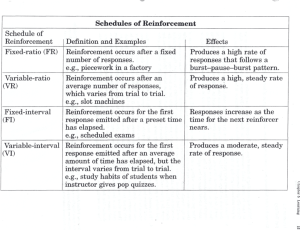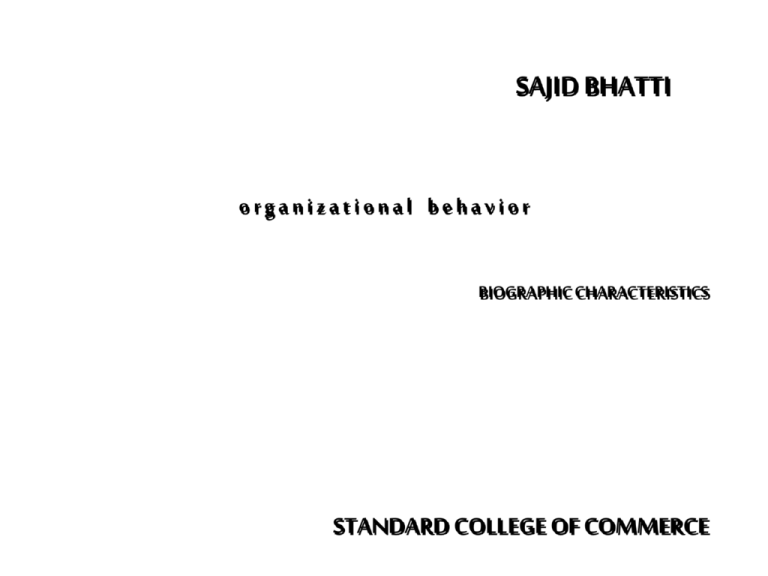
SAJID BHATTI
organizational behavior
BIOGRAPHIC CHARACTERISTICS
STANDARD COLLEGE OF COMMERCE
Biographical Characteristics
Biographical Characteristics
Personal characteristics—such as age, gender,
and marital status—that are objective and
easily obtained from personnel records.
SAJID BHATTI
2–1
Ability, Intellect, and Intelligence
Ability
An individual’s capacity to perform
the various tasks in a job.
Intellectual Ability
The capacity to do mental activities.
Multiple Intelligences
Intelligence contains four subparts:
cognitive, social, emotional, and cultural.
SAJID BHATTI
2–2
Dimensions of
Intellectual Ability
• Number aptitude
• Verbal comprehension
• Perceptual speed
• Inductive reasoning
• Deductive reasoning
• Memory
E X H I B I T 2–1
SAJID BHATTI
2–3
Physical Abilities
Physical Abilities
The capacity to do tasks
demanding stamina, strength,
and similar characteristics.
SAJID BHATTI
2–4
Nine Physical Abilities
Strength Factors
1. Dynamic strength
2. Trunk strength
3. Static strength
4. Explosive strength
Flexibility Factors
5. Extent flexibility
Other Factors
6. Dynamic flexibility
7. Body coordination
8. Balance
9. Stamina
E X H I B I T 2–2
SAJID BHATTI
2–5
The Ability-Job Fit
Employee’s
Abilities
SAJID BHATTI
Ability-Job
Fit
Job’s Ability
Requirements
2–6
Learning
Learning
Any relatively permanent change in behavior
that occurs as a result of experience.
Learning
• Involves change
• Is relatively permanent
• Is acquired through experience
SAJID BHATTI
2–7
Theories of Learning
Classical Conditioning
A type of conditioning in which an individual
responds to some stimulus that would not
ordinarily produce such a response.
Key Concepts
• Unconditioned stimulus
• Unconditioned response
• Conditioned stimulus
• Conditioned response
SAJID BHATTI
2–8
Source: The Far Side ®
by Gary Larson © 1993
Far Works, Inc. All rights
reserved. Used with
permission.
E X H I B I T 2–3
SAJID BHATTI
2–9
Theories of Learning (cont’d)
Operant Conditioning
A type of conditioning in which desired voluntary
behavior leads to a reward or prevents a punishment.
Key Concepts
• Reflexive (unlearned) behavior
• Conditioned (learned) behavior
• Reinforcement
SAJID BHATTI
2–10
Theories of Learning (cont’d)
Social-Learning Theory
People can learn through observation
and direct experience.
Key Concepts
• Attentional processes
• Retention processes
• Motor reproduction processes
• Reinforcement processes
SAJID BHATTI
2–11
Theories of Learning (cont’d)
Shaping Behavior
Systematically reinforcing each successive step that
moves an individual closer to the desired response.
Key Concepts
• Reinforcement is required to change behavior.
• Some rewards are more effective than others.
• The timing of reinforcement affects learning
speed and permanence.
SAJID BHATTI
2–12
Types of Reinforcement
Positive reinforcement
– Providing a reward for a desired behavior.
Negative reinforcement
– Removing an unpleasant consequence when the
desired behavior occurs.
Punishment
– Applying an undesirable condition to eliminate an
undesirable behavior.
Extinction
– Withholding reinforcement of a behavior to cause its
cessation(end).
SAJID BHATTI
2–13
Schedules of Reinforcement
Continuous Reinforcement
A desired behavior is reinforced
each time it is demonstrated.
Intermittent Reinforcement
A desired behavior is reinforced
often enough to make the
behavior worth repeating but not
every time it is demonstrated.
SAJID BHATTI
2–14
Schedules of Reinforcement (cont’d)
Fixed-Interval Schedule
Rewards are spaced at
uniform time intervals.
Variable-Interval Schedule
Rewards are initiated after a
fixed or constant number of
responses.
SAJID BHATTI
2–15
Schedules of Reinforcement (cont’d)
Fixed-ratio
E X H I B I T 2–4
SAJID BHATTI
2–16


